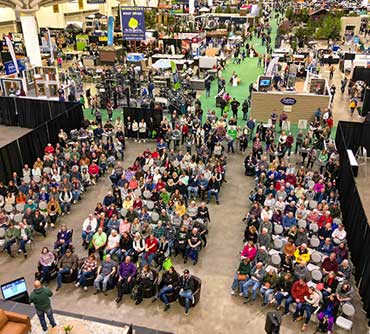
Press Releases
E-ticketing The Virtual Box Office
Now, companies such as dmg world media and Merchandise Mart Properties Inc. use the technology for most of their consumer shows, which also has led to a change in the way they market their shows.
Lisa Kropf, dmg world media's director of marketing and sponsorship in the Home Interests North America division, said the company started using e-ticketing in 2006.
“It shifted the whole way we did marketing,” she added. “It allowed us to track marketing, use promo codes and track sales.”
Each time someone bought a ticket online, dmg was able to capture that person's information – demographics and buyer interests, for example – something that wasn't possible when an attendee bought a ticket at the door.
“We try to categorize by interest and ask them why they're coming to the show,” Kropf said. “It also helps us sell exhibit space and allow product to be much more relevant.”
Joel Gawlik, MMPI's business planning and analysis director, said his company adopted e-ticketing for its Canadian shows first and then shifted it to include U.S. consumer shows as well. “We sell tickets online months in advance,” he said.
Another added benefit to selling tickets online, Gawlik said, was the ability to see exactly how many tickets were sold each day at every show, how many discounts were used and a demographic profile of every buyer. Then that information could be synched through the Web and linked with the company's other shows.
“The shift to online has been noticeable,” he added. “If we didn't have e-tickets, (people) would still come, but it's easy for us. People just come up and get their tickets scanned.”
Dmg and MMPI both use Toronto-based tix123, a division of registration company MicroSpec, for their e-ticketing and on-site ticket kiosks.
Brian Eastcott, tix123's director of business development, said the company started in June 2004 when it became clear there was a need in the marketplace for e-ticketing software. “(Shows) were trying to do it on their own, and we have an expertise in development and databases,” Eastcott said. “We've been growing and growing since then.”
He added, “Our primary motivation when we build anything is to keep it simple.” The e-ticketing form on the consumer shows' Web sites is short enough to collect vital information and still allow people to buy their tickets within seconds, Gawlik said. “You collect information from that person that's helpful for marketing, print the ticket at home and then bring them to the show.”
If someone decided to buy their ticket at the actual show but still wanted to avoid box-office lines, tix123 also offers self-service kiosks. Kropf and Gawlik said the kiosks, in conjunction with e-ticketing, have allowed them to cut back on box office personnel. “There's a 50-50 split with people using kiosks, so we save money on personnel,” Gawlik said.
One thing e-ticketing hasn't necessarily done is increase attendance. But, Kropf added, if the details that are captured when people buy tickets online are used correctly, it could have an impact on a show. “For every show, we probably send (up to) six e-mails ... (for example) to promote products for Father's Day or the holidays,” Kropf said. The value, she added, is getting the person's contact information.
“There are some companies that pay $5 for that lead,” Kropf said.
The other benefit to e-ticketing is that it drives people to the show's Web site who might not have otherwise visited it. “Shows should realize that Web sites are so important to their marketing campaigns,” Eastcott said. “Without (offering) e-ticketing, it's like not closing the loop. Convenience to the visitor is really secondary; it's about marketing to your targets by using promo codes and e-blasts to direct people to the purchase page.”
“Our Web site traffic went up 300 percent after online ticketing was instituted (in spring 2006),” Kropf said. The surge in traffic prompted dmg to redesign all of its Web sites that used e-ticketing based on how people were using the sites. She added, “They are much more user-friendly now.”
With the 35 dmg world media shows that use e-ticketing, Kropf said the increases in Web statistics in the past year has been substantial:
- 3.5 million total page views between January and May of this year, compared with 3.3 million total page views in 2007
- 1.1 million total visits during that period, compared with 1 million during the same period last year
- 772,000 total unique visitors, compared with 660,000 last year
Now that buying tickets online seems to have caught on, Eastcott said his company wants to streamline the process even more by allowing people to download bar codes onto their cell phones that can be scanned at the show's door and by printing multiple tickets on one page, instead of just one ticket per page. “Both are ways of being more green,” he added.
Author: Rachel Wimberly




